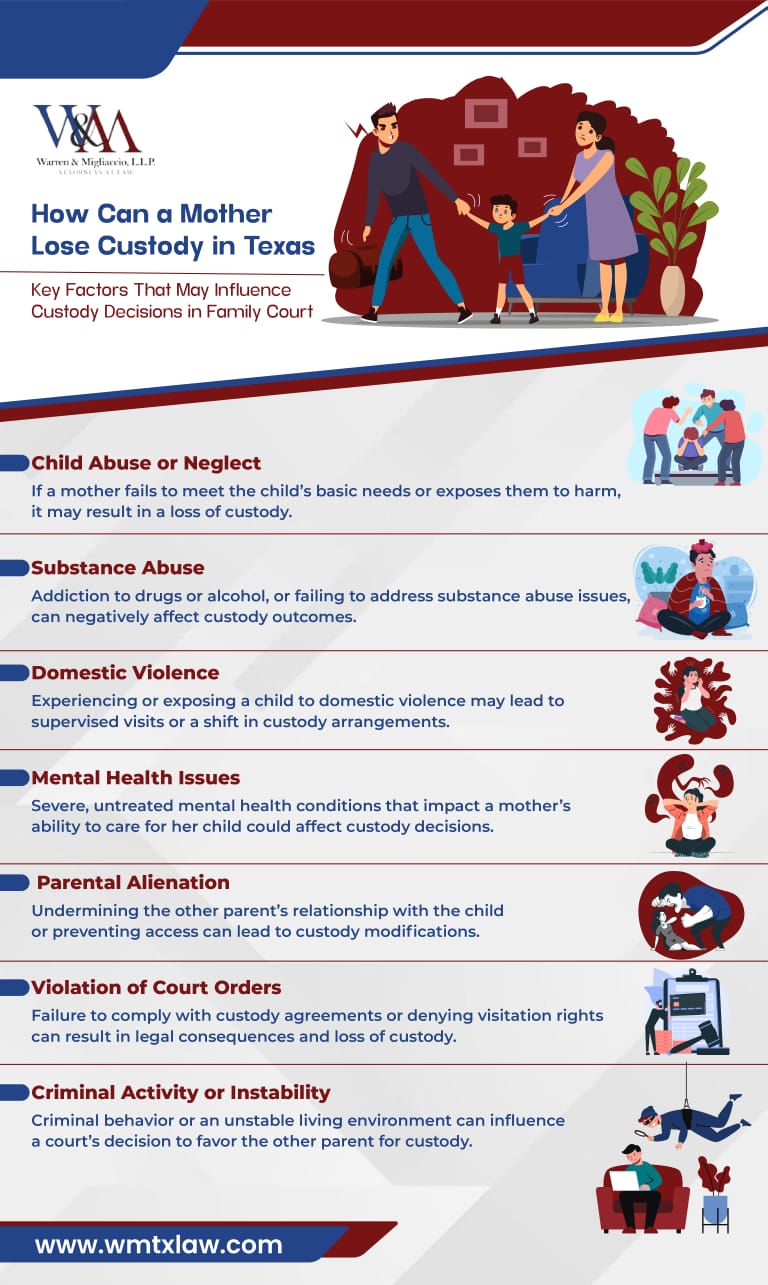Losing custody of a child is a profoundly distressing possibility for any parent. For mothers in Texas, understanding the legal landscape is crucial, especially the distinction between the custodial parent, who has primary residence and decision-making authority over the child, and the non-custodial parent.
Texas courts base custody decisions on the best interests of the child. Certain situations can put a mother’s custody rights at serious risk.
This guide breaks down the reasons a mother might lose custody in Texas. We’ll look at specific circumstances courts consider and sketch out the legal process involved.
Knowing this stuff can help mothers in custody battles understand what’s at stake and how to protect their rights.
Common Reasons a Mother Can Lose Custody in Texas
It’s a common misconception that Texas courts favor mothers in custody disputes. The courts are supposed to focus on the child’s best interest, prioritizing the child’s life and well-being over the parent’s gender.
Several factors might push a judge to decide that removing custody from a mother is best for the child’s welfare.

1. Child Abuse or Neglect
Child neglect, which includes various forms of inadequate care and supervision detrimental to a child’s well-being, is one of the most serious reasons for losing custody. Abuse can include physical harm, emotional torment, sexual abuse, or failing to provide basics like food, shelter, medical care, or supervision.
If there’s credible evidence that abuse or neglect affects the child’s well-being, the court may change the custody arrangement.
The Texas Department of Family and Protective Services (DFPS), often called Child Protective Services (CPS), investigates these allegations. If they find immediate danger, they might remove children from the home.
CPS findings are hugely influential in court custody decisions under Texas state law. Neglect could mean not sending a child to school, leaving young kids alone, or exposing them to dangerous situations.
The court looks at how severe and persistent the behavior is. Proving abuse or neglect usually requires documentation, witness statements, or CPS reports. It’s not something the court takes lightly.
2. Substance Abuse
A mother’s addiction to drugs, alcohol, or mental illness can seriously impact her ability to care for her child. If substance abuse or a mental health condition puts the child in danger or leads to neglect, it’s a major red flag in custody cases.
Evidence of drug use, chronic alcoholism, or untreated mental illness raises big concerns about the child’s safety. Courts often order drug tests if substance abuse is suspected.
Positive tests, a history of abuse, or untreated mental illness without proof of recovery can support a change in custody. The court might require supervised visits or rehab as conditions for more access later on.
Showing consistent sobriety, managing mental health, and participating in recovery programs is often necessary to counter these allegations. The court wants real assurance that the parent can put the child first. A relapse can undo a lot of progress.
Attorney Migliaccio’s View on Substance Abuse Cases
I once worked with a mother who was struggling with substance abuse, and it nearly cost her custody. She tried to hide it, but court-ordered tests kept coming back positive.
Every relapse put her further away from her child, and the stakes couldn’t have been higher. We set up a plan: she entered treatment, joined a support group, and checked in regularly to show her sobriety.
Her commitment eventually impressed the court and her child’s counselor. What really changed things was her attitude—she stopped making promises and started taking action.
It was a long road, but honesty and effort made a real difference. Sometimes, the court just wants to see you’re trying for real, not just saying it.
3. Mental Health Issues
Serious, untreated mental health problems can affect a mother’s fitness as a parent. If something like severe depression or bipolar disorder makes it hard to provide stable care, it could lead to a loss of custody.
The court isn’t focused on the diagnosis itself—it’s all about how it impacts parenting and the child’s emotional well being. Judges look at medical records, expert opinions, and observations from therapists or social workers.
If a mother is actively managing her mental health with therapy or medication, that’s usually seen in a much better light. The court wants to know if the condition is a real risk to the child.
Showing insight and sticking to a treatment plan matters. Cooperation with evaluations and following through on recommendations is important.
4. Domestic Violence
Domestic violence in the home is extremely damaging to a child’s safety and emotional health. This includes violence against the child, the other parent, or anyone else in the household.
Even just witnessing domestic violence can be enough to influence custody decisions. Courts take this very seriously.
Police reports, protective orders, or a documented history of abuse can result in supervised visits or, in severe cases, losing parental rights. Texas law specifically addresses family violence in custody cases.
Sometimes, a mother who’s a victim of domestic violence can also come under scrutiny if the court thinks she didn’t protect the child from the abuser. Seeking help—like going to a shelter or getting counseling—shows the court you’re taking steps to keep your child safe.
5. Parental Alienation
Parental alienation is when one parent tries to turn the child against the other parent, negatively impacting the child’s relationship with the other parent. This could mean badmouthing, blocking visits, or making false accusations.
This kind of behavior is considered harmful to the child. Courts don’t like it, and it can backfire badly.
Case Study: The Impact of Parental Alienation on Custody Decisions
Duffey v. Duffey, No. 14-16-00144-CV (Tex. App.—Houston [14th Dist.] 2018)
In this Texas case, a mother who originally had sole custody lost it when the father proved parental alienation. The court found she’d kept the kids from their father and made unfounded abuse claims.
She also ignored counselors’ advice about the kids’ therapy. The appeals court agreed with the trial court’s decision to give the father custody, showing how seriously Texas courts take alienation. Source:
Texas courts want children to have healthy relationships with both parents if possible. If a judge finds a mother is systematically alienating the child from the father, it can be grounds for changing custody.
These claims might be investigated with psychological evaluations or a guardian ad litem. Supporting the child’s relationship with the other parent is essential for keeping custody.
Helping with communication and visits, and avoiding negative talk, reflects well on a parent. Proven alienation can seriously hurt a custody case.

6. Violation of Court Orders
Ignoring the terms of a custody order can show the court you’re not willing to co-parent, which could lead to losing custody. This includes denying court-ordered visits, moving the child without the other parent’s consent, or not following decision-making protocols.
Repeated violations tell the court the current arrangement isn’t working or that the parent can’t be trusted to follow orders. The other parent can file enforcement actions, which might result in contempt, fines, make-up time, or changes in custody.
If the current order isn’t working, the right way to handle it is to ask the court for a modification—not just break the rules. Making a good-faith effort to comply, even if you disagree, is important.
7. Criminal Activity or Unstable Lifestyle
Criminal behavior, especially if it puts a child at risk or shows poor judgment, can lead to losing custody. An unstable lifestyle—like frequent moves, bad housing situations, or hanging around dangerous people—can also hurt your case. Providing a stable home is crucial, as courts assess whether a parent can offer a secure and nurturing environment for children.
Courts want stability and safety for kids. Convictions for violence, drugs, or neglect are a big deal in custody battles.
Even without convictions, ongoing criminal associations can be damaging. The court looks at how these things affect the parent’s ability to provide a safe, consistent home.
Keeping steady housing, a job, and positive relationships helps your case. Addressing criminal history and showing real change can help, too. Stability really matters to Texas courts.
Custody Loss and Court Actions
| Reason for Potential Loss of Custody | Examples | Potential Court Actions |
|---|---|---|
| Child Abuse/Neglect | Physical/emotional harm, failure to provide basic needs, lack of supervision. | CPS investigation, safety plan, removal, restricted/supervised visitation, custody modification, termination of rights. |
| Substance Abuse | Drug addiction, alcoholism impacting parenting, endangering child. | Drug testing, required rehab, supervised visitation, custody modification favoring sober parent. |
| Untreated Mental Health Issues | Severe conditions impairing judgment or ability to provide stable care. | Psychological evaluation, required treatment, supervised visitation, custody modification if risk to child exists. |
| Domestic Violence | Violence in the home (against child or witnessed), failure to protect child. | Protective orders, restricted/supervised visitation, counseling, custody modification favoring non-violent parent. |
| Parental Alienation | Systematically turning child against other parent, interfering with relationship. | Therapeutic intervention, custody evaluation, change in primary conservatorship, supervised visitation for alienating parent. |
| Violation of Court Orders | Denying visitation, unauthorized relocation, failure to follow custody arrangement. | Contempt proceedings, fines, make-up time, modification of custody or visitation orders. |
| Criminal Activity/Instability | Convictions (drugs, violence), unstable housing, dangerous associations. | Assessment of risk, supervised visitation, custody modification to provide stable environment. |
The Data Behind How a Mother Can Lose Custody in Texas
Despite the old belief that mothers rarely lose custody, recent national and Texas data show that’s not always true—especially when serious claims are involved. Keeping detailed records related to a parent’s involvement in their child’s life can be crucial in these cases. For instance:
Mothers who allege abuse by the father in custody litigation lose primary custody about 25% of the time, but when the father raises a claim of “parental alienation” (accusing the mother of turning the child against him), the rate at which mothers lose custody doubles to over 50%—and jumps as high as 73% when courts credit the alienation claim*.*
Source: U.S. Department of Justice, Overview of Family Court Outcomes Study (https://www.ojp.gov/pdffiles1/nij/grants/302141.pdf)
The Legal Process of Losing Custody in Texas
Losing parental rights or primary custody is a huge legal step, and Texas law lays out a specific process. Seeking legal guidance from a knowledgeable family law attorney is crucial, as they can help you understand the legal nuances, prepare for court, and develop effective strategies that prioritize the child’s best interests. Usually, the parent asking for the change has to show something major has changed and that the new arrangement would be best for the child.

Here’s an overview of the typical steps in a family law case where custody could be lost:
1. Filing a Petition
The process kicks off when someone files a Petition to Modify the Parent-Child Relationship with the right Texas court. This could be the other parent, a relative with standing, or even DFPS/CPS.
The petition lays out the alleged change in circumstances and asks the court to change the existing custody order. Sometimes, it requests that the mother no longer be the primary managing conservator. If a parent is deemed unfit, they may lose custody or have limited decision-making authority within the parenting plan, especially if there is evidence of risk to the child, such as a history of family violence or emotional abuse.
This document formally starts the child custody case and has to be served on the mother, so she knows what’s happening. It’s important to respond quickly, ideally with a family law attorney’s help.
If you don’t respond, you risk a default judgment.
2. Temporary Orders Hearing
After filing, the petitioner may request a hearing for temporary orders. This hearing deals with immediate issues and sets temporary rules for custody, visitation, child support, and residency while the case moves forward.
Judges might order drug testing, psychological evaluations, or supervised visitation if there are serious concerns. Temporary orders set the tone for the case and sometimes influence the final outcome.
Having a strong case and good legal representation early on is a big advantage. Even during temporary hearings, the judge’s main concern is always the child’s best interest, including the child’s health, emotional needs, and safety.
3. Investigation and Discovery
The court needs evidence to make custody decisions, so this stage is all about gathering information. The court might bring in a custody evaluator or an amicus attorney to dig into the allegations, do home studies, interview parents and kids, and check out records like school or medical files. They assess a parent’s fitness in relation to the child’s physical and emotional well-being, ensuring that any behaviors, such as domestic violence or substance abuse, do not pose a risk to the child’s overall health and safety.
If someone alleges abuse or neglect, Child Protective Services may run its own investigation. Both sides also exchange documents, answer written questions, and sometimes give depositions—sworn testimony outside of court.
Being open and honest (with your lawyer’s guidance) is usually the best approach here.
4. Mediation
Most Texas courts require mediation before a custody dispute goes to trial. Mediation brings in a neutral third party to help parents negotiate and hopefully settle their custody disagreements, fostering a healthy co-parenting relationship through collaborative efforts.
It’s confidential and less combative than a trial. If parents agree, they sign a Mediated Settlement Agreement (MSA), which usually becomes the final court order.
Mediation can save everyone time, money, and a lot of stress. But if it doesn’t work, the battle continues to trial.
5. Trial
If there’s still no agreement, the case moves to trial. Sometimes a judge decides everything, but on specific issues like primary conservatorship, there could be a jury.
Both sides present evidence and call witnesses. Witnesses are questioned by both attorneys.
The judge reviews all the testimony and evidence, following Texas family code standards and focusing on the child’s best interest. The court then issues a final custody order, which covers legal custody, physical custody, child support, and possibly geographic restrictions.
This order lays out who the managing conservators are—either joint or sole—and who the possessory conservators are.
How Mothers Can Protect Their Custody Rights
Facing the threat of losing custody is scary, but mothers aren’t powerless. Providing a nurturing environment that ensures a stable and supportive home is crucial. Staying focused on the child’s well-being is key. Here are some practical strategies:

1. Follow All Court Orders
Stick to the terms of your current court order—visitation, child support, communication, all of it. Following the rules shows you respect the process and are committed to co-parenting.
Document everything. If you think the order needs to change, don’t just ignore it—file a formal request for modification. Violating the order can backfire badly and may require court intervention to resolve contested modifications.
2. Document Everything
Keep detailed records about your child and your interactions with the other parent. Track visitation exchanges, save messages, hold onto receipts for expenses, and jot down any notable events or concerns.
This documentation can be a lifesaver if things get messy. It helps refute false claims and backs up your side of the story. Your attorney will thank you for it.
3. Address Any Personal Issues
If you’re dealing with substance abuse, mental health struggles, anger management, or providing emotional support for the child, don’t wait—get help right away. Attend therapy, join support groups, follow treatment plans, and stay sober if that’s part of the issue.
Bring proof of your progress—certificates, therapist letters, clean drug tests. Taking responsibility and showing effort goes a long way. Letting problems fester just gives the other side ammunition.
4. Avoid Negative Talk About the Other Parent
Don’t criticize the other parent in front of your child or on social media. Prioritizing your child’s emotional needs is crucial; encourage a healthy relationship between your child and the other parent, as long as it’s safe to do so.
Keep communication respectful and businesslike. Document your attempts at cooperation. Courts notice when you rise above the drama.
Related: What Not to Say During a Custody Battle in Texas: Top 10 Phrases to Avoid
5. Hire an Experienced Family Law Attorney
Custody battles in Texas are complicated. Having knowledgeable and experienced legal representation on your side is huge.
They know the law, the procedures, and the local judges. Your attorney will help you gather evidence, prepare paperwork, represent you in court, and guide you through tough decisions. Solid legal help can make all the difference.

Frequently Asked Questions
Medical Records and Subpoenas
What types of medical records can be subpoenaed in a Texas divorce?
In Texas divorce cases, courts may subpoena medical records if relevant. These can include mental health records in custody disputes, substance abuse treatment if addiction affects parenting, physical health records for spousal support or asset division, and therapy notes in domestic violence claims.
Are medical records automatically accessible during a Texas divorce?
Medical records are protected under HIPAA and Texas privacy laws. To access them in a divorce case, a party must prove the records are directly relevant to contested issues. First, they must obtain a formal subpoena through the discovery process. Second, they may face physician–patient privilege objections. Third, a court order authorizing access is typically required.
Can substance abuse treatment records be subpoenaed in Texas divorces?
These records have special federal protection under 42 CFR Part 2:
- Firstly, you need a specialized court order that specifically allows disclosure
- Secondly, the court has to find that public interest outweighs privacy
- Thirdly, strict limits on redisclosure must be set
- Fourthly, there are extra notice and contest requirements
- Fifthly, courts are more likely to order disclosure if child welfare is at stake
Evidence and Custody Impact
What evidence is needed to subpoena medical records in a Texas divorce?
The party requesting records must show:
- Specific reasons the records are relevant to contested issues
- That the info can’t be found with less intrusive methods
- The request is narrowly tailored—specific providers and time frames
- All procedural steps are followed, including proper subpoenas
- General claims without evidence usually aren’t enough to overcome privacy protections
How can medical records affect child custody determinations in Texas?
Medical records can influence custody in Texas. For example, they may reveal untreated issues like mental illness or substance abuse that affect parenting. Conversely, records showing consistent treatment can support claims of stability. Ultimately, courts focus on how health impacts parenting—not just the diagnosis.
Conclusion
While Texas courts generally recognize the vital role mothers play in a child’s life, custody decisions are always centered on the child’s best interests—not the parent’s gender. Factors like neglect, abuse, substance abuse, or interference with the other parent’s rights can put a mother’s custody at risk. If you’re facing a custody dispute or concerned about protecting your parental rights, it’s important to understand the legal standards and take proactive steps.
Our experienced family law attorneys are here to help you navigate the process, protect your relationship with your child, and ensure your voice is heard. Call us at (888) 584-9614 or contact us online to schedule a confidential consultation and get the guidance you deserve.

